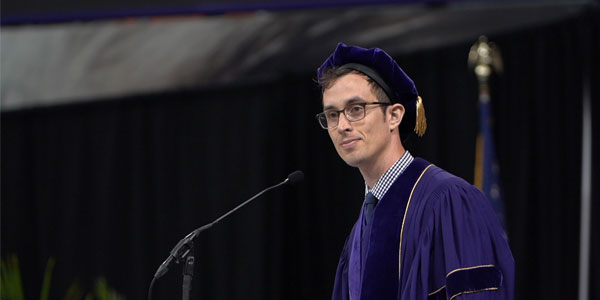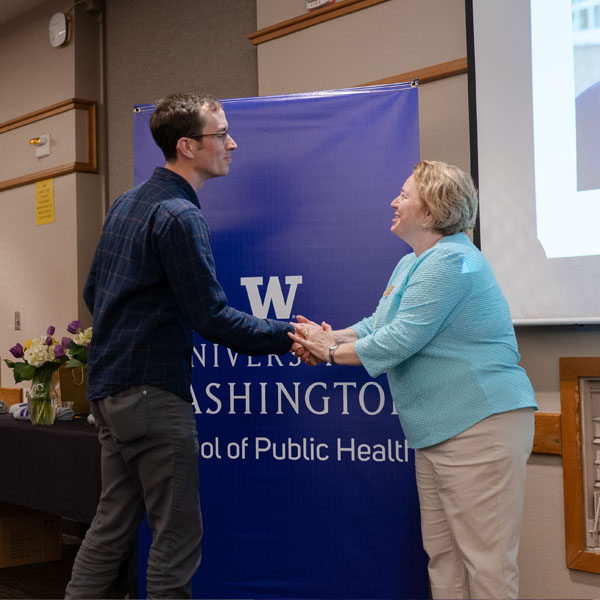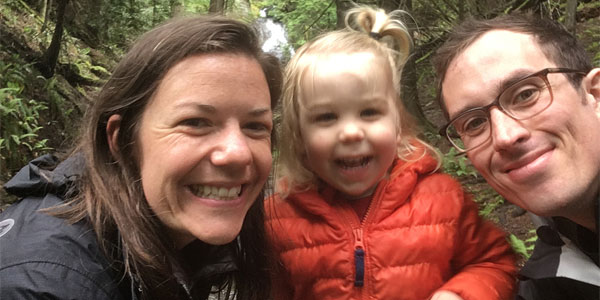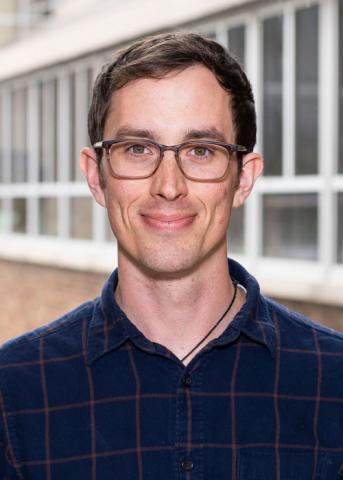Christopher Kemp is dedicated to the study of implementation. That is, the process of getting interventions and programs that work to the people who need them the most. His main focus over the last four years – defined in part by his experience in the Peace Corps in rural South Africa – has been the integration of mental health care, HIV treatment and other chronic disease services in low-resource settings.
“The science of implementation tends to be complex, fancy and technical. It can be intimidating,” Kemp said in his speech at the SPH graduation celebration on June 16. “Yet under it all I believe the fundamental truth is neither complex, nor fancy, nor technical."
Kemp received a PhD in Implementation Science from the Department of Global Health, which bridges the Schools of Public Health and Medicine. He also received the Gilbert S. Omenn Award for Academic Excellence, one of the School’s highest honors.
"The science of implementation brings us back to something we’ve known all along: it is about people.”
What motivates you about global health?
The need, the challenge and my collaborators. The unmet need for essential health services in low-resource settings is remarkably high. This field deserves as much attention as it can get.
What are the most pressing challenges in global mental health?

There aren’t enough mental health care workers to deliver specialized interventions in most parts of the world, and clinicians in primary care and other settings are over-worked even before being asked to add mental health services.
Additionally, mental ill health is often highly stigmatized and mental health literacy is low. We need broader approaches to mental health promotion and the prevention of mental ill health that embrace the potential roles of all parts of our society – not just the health system. Schools, employers, religious institutions will all need to be involved.
How are you trying to solve these problems?
I’ve been focused on the first issue – how to develop strategies for care integration and the successful delivery of mental health services by generalist providers. I led one study to understand how researchers and implementers around the world have handled the issue of supervision in the context of “task-sharing,” which is when generalist providers deliver components of specialist mental health services. Appropriate supervision is critical to making task-sharing work – getting these providers to deliver mental health services and to do so with fidelity. We wanted to learn about the most effective and cost-saving models for supervision.
What we found is that there’s almost no evidence of the effectiveness of supervision models for task-sharing, and everyone is more or less making it up on their own. Task-sharing usually means that specialist providers have to supervise generalist providers, but specialists are not normally trained and paid to supervise – they’re trained and paid to care for patients. We recommended some potentially cost-effective tools to improve supervision in low-resource settings, but our findings also showed how much more work needs to be done.
What about your work to integrate mental health care into HIV and chronic disease services?
For the last four years, I’ve been part of a team from the UW and the University of KwaZulu-Natal implementing an integrated care model for the treatment of depression and other common mental disorders, at the primary care level, among patients with HIV and other chronic diseases in rural South Africa. The idea is that chronic-care nurses are trained to recognize common mental disorders among their patients, assess the severity of those disorders, and make appropriate referrals.
We’ve seen some promising evidence that this model helps patients with depression get better, though we’re finding that there are bottlenecks to service delivery and many patients get missed. I'm exploring how to better implement this model and widen some of those bottlenecks. We’re using the results to tailor our strategies and make changes in the field.

Why is implementation science so important?
It has the potential to improve capacity to move interventions to scale – from a research setting to the population level – and deliver them where they are needed most. But we need energy and commitment to improve our field’s methods and help it actually meet that potential.
Why was this the right field for you?
I’ve always been interested in research, but I was hesitant to join a discipline that was purely academic or one that would isolate me from the application of my work. I wanted to learn a science that bridged the gap between research and practice, and that would keep me firmly connected to the world outside academia.
What lessons from the Peace Corps impacted your work in global health?
Global health as a field can be awfully divorced from the reality of people’s lives in low-resource settings, with its often narrow focus on individual diseases and chasing donor funds. Peace Corps allowed me to live at the community level and start to understand the full complexity of life in a totally different place, and I’ve tried to hold that community-based perspective through my work.
How did you see this play out during your service?
I lived in an area in South Africa that had among the world’s highest HIV prevalence rates, yet HIV was not a top concern for most of the youth I knew. They were more focused on their education, finding jobs and starting families. Programs seeking to engage these youth around HIV prevention – without considering their other priorities – are unlikely to succeed.
Was HIV prevention a key part of your work there?
I was a community HIV/AIDS outreach volunteer with a small community organization that provided services for people living with HIV. I helped to secure grant funding, improve their systems for monitoring and evaluation, and develop new and impactful programs for community-based psychosocial support.
What inspired you to get involved in mental health work?
My family experienced a tragic loss and I sought out ways to get involved in mental health and suicide prevention. My first job in public health, I worked for a social psychiatrist who studied the delivery of community-based interventions for suicide prevention. Since then my interest in mental health and global mental health has deepened as I’ve seen so much energy going into this field, and as I’ve come to understand how much unmet need there is in the world for mental health promotion and services.

What do you like to do for fun?
Going on adventures with my partner, Emily, and our two-year old child, Ezra. We go hiking, camping, swimming and skiing.
How do you manage being a scholar-student-parent?
I’ve loved being a parent. Among so many other things, our child grounds me and reminds me of the bigger picture. Childcare can be a big challenge and huge expense, especially in Seattle, but my understanding mentors and somewhat flexible schedule have helped me absorb most of the bumps along the way.
What do you like most about Seattle?
We’re very spoiled here – between the mountains, the lakes and the ocean, we’ve got so many opportunities to enjoy the outdoors. I also think we’re in a city that, overall, tries to do better: to celebrate diversity, to be open-minded, to lessen our impact on the environment, and to reduce inequities. We don’t always succeed, but I do love living in a city that keeps trying.

